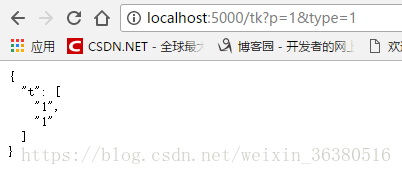Flask带参URL传值的实现方法
Java知音_ 人气:0Flask带参URL传值的方法
在Flask中编写链接URL比较容易,这里并不针对这些讨论,但URL中如果包含可变部分路由以及携带一些参数应该怎么做呢?
我们可以使用Flask模板提供的辅助函数url_for(),这里通过一个完整的小例子来介绍带参URL传值的方法。
定义一个包含动态路由的Flask处理类
from flask import Flask, render_template
app = Flask(__name__)
@app.route('/')
def my():
return render_template('/test.html')
@app.route('/test/<name>', methods=['GET'])
def test(name):
print name
return render_template('/test.html')
if __name__ == '__main__':
app.run(debug=True)页面
<!DOCTYPE html>
<html lang="en">
<head>
<meta charset="UTF-8">
<title>带参URL传值方法</title>
</head>
<body>
<a href="{{ url_for('test',name=1) }}" rel="external nofollow" >点击这里查看</a>
</body>
</html>url_for('test',name=1)相当于我们传递的XXX/?name=1,点击这个链接,执行了动态路由test,并将name传入输出,此时显示:http://localhost:5000/test/1
我们看控制台

成功将参数打印出来。
还有一种URL传值的格式
假如URL是 http://localhost:5000/tk?xxx=1&xx=1 这种,那我们后台路由如何接收呢?
此时可以使用Flask request方法:request.args.get(),例如,前台请求URL为 http://localhost:5000/tk?p=1&type=1
接收参数的代码
@app.route('/tk', methods=['post','get'])
def tk():
p = request.args.get('p')
type = request.args.get('type')
print(p)
print(type)
return jsonify({'t': [p, type]})
相比我们更倾向用第一种,无论get或者post都可以使用,也更方便。
Flask传参定义id 及通过传参定义属性名称
<canvas id=m_chart_sales_by_apps_1_{{ i+1 }} chang_1_{{ i+1 }}={{ weekdata[i][‘chang'] }}字符串不需要通过引号定义,直接连续输入变量转化为字符传
以上为个人经验,希望能给大家一个参考,也希望大家多多支持。
加载全部内容